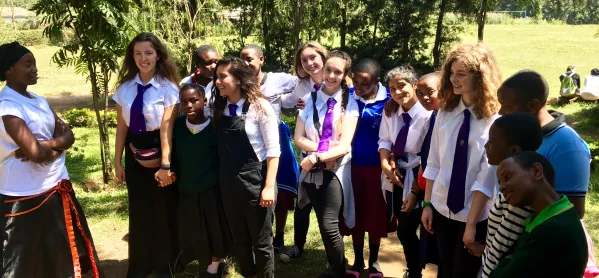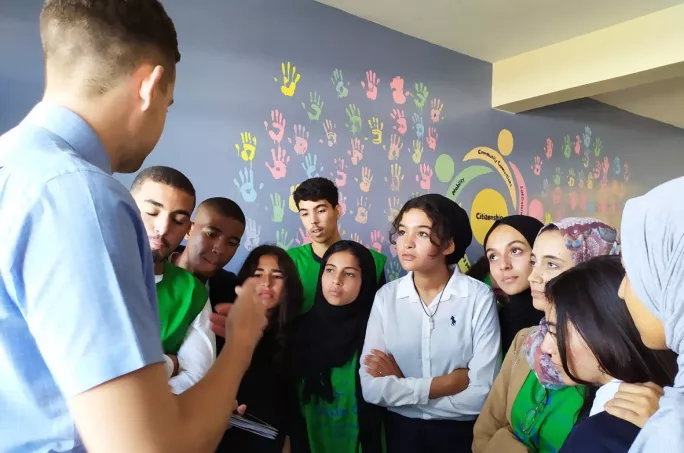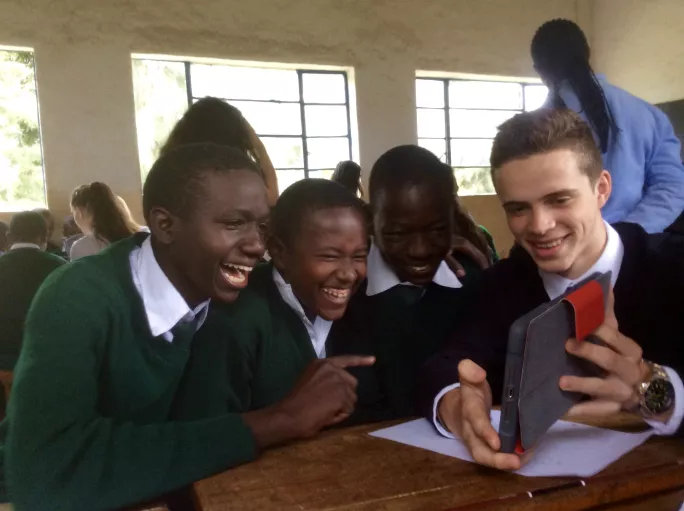How to use online partnerships to teach climate change

We’re often told that small changes can make a difference when it comes to protecting the environment. But it can be hard to see the impact of these changes.
So Tom Cadman, a teacher at Littlecoates Primary in Grimsby, was thrilled when he found out that a Year 6 pupil had stopped her mother from getting single-use plastic bags at the supermarket.
That pupil had been involved in a zero-waste learning project developed through the Connecting Classrooms Through Global Learning programme, a partnership from the British Council and the Foreign, Commonwealth and Development Office, which provides resources and support to help teachers deliver lessons and projects around the United Nations’ Sustainable Development Goals, as well as offering funding for international partnerships and continuing professional development for teachers around global issues.
Littlecoates paired with a school in Morocco, and together pupils tracked the journey of waste in both countries, highlighting the dangers surrounding plastic pollution, and how it ends up on the shores of different countries around the world.

The pupils told their partner school counterparts about daily life in their communities, attitudes towards the environment and habits to do with waste, including where it ends up.
Helping pupils to understand climate change
Cadman says the partnership was instrumental in helping his pupils to understand climate issues on a global scale.
“The children were given exposure to some of these issues and their impact on the world, and how they can make small changes that can contribute to the planet,” he says.
“They found that if you don’t dispose of waste properly it could end up on the other side of the world, and that gives them that motivation to try to make a difference. And you can just see the small difference that makes. It is having an impact.”
Like Littlecoates, Holy Rood High School in Edinburgh has been working with schools internationally with the help of the Connecting Classrooms programme.
Teacher Sandy Radford explains that the school has partnered with colleagues in Tanzania for two decades, but more recently became lead for a cluster of 20 partnerships between schools in Scotland and Tanzania, focusing on global learning around sustainability and climate change.
Each school has committed to building a project around sustainability. Holy Rood’s partner school in Tanzania, for example, has led a series of zero-waste lessons using resources from Connecting Classrooms, and pupils have since started an eco group, campaigning to get recycling bins into schools.
Through the online partnerships, schools are able to share updates on their progress and discuss issues surrounding the climate, particularly those facing their own communities. Radford says this helps to bust stereotypes.

“It’s about building empathy and connection, thinking about what it would be like if you were in a different situation. For example, why does Tanzania care so much about sustainability that they’ve banned plastic bags? Because they’re feeling climate change so much harder.”
Online partnerships are a way “we can support kids to become global citizens”, Radford adds.
Supporting pupils to become global citizens
“We’ve used our partnership as a lens to teach about sustainability, showing that there are students who are experiencing real hardships and challenges because of climate change.
“We want to try and strike a balance between making sure we’re taking personal responsibility for things, but recognising we’re part of something bigger and we need our kids to be global citizens as well.”
Although communication between international schools can be a challenge sometimes, Radford advises schools considering bringing global learning in through online partnerships to “go for it”, as the programme is incredibly valuable for students and teachers alike, in the classroom and beyond.
“We saw a massive overlap between the kids involved in the project and signing petitions and writing letters. It keeps them engaged in the world around them,” he adds.
Building bridges
“You are building bridges and friendships. It really is a wonderful thing,” says David Smith from Edenderry Primary School in Banbridge, Northern Ireland.
Smith has developed a Europe-wide environment project through the online community for schools - eTwinning, which has received over 800,000 teachers registrations, is co-founded by Erasmus+, the European Union, and is managed in the UK by the British Council.
Using eTwinning’s online tools, which lets teachers network, discuss various projects and ideas with colleagues around the world, he connected online with a teacher in Spain who previously had a career as an arborist and landscape designer.
They combined their expertise to develop a project that became Tree Detectives, involving around 25 schools across Europe, from Turkey to Latvia, to Finland.
Students collect data about trees in the area surrounding their school, and get to understand about their growth by identifying leaves and budding patterns throughout the year.
Working with citizen science app iNaturalist, students share the data around species and trends with scientists to help them better understand changes in seasons and the climate.
“It reaffirmed that the trend is and has been that the seasons are more erratic, as the budding is becoming earlier. Therefore, we asked, what is making these changes? We made observations, for example - unnatural heat waves at different times of the year.”
These observations were shared between the schools, and so the project coordinated well with the curriculum, especially maths, science and language, Smith says.
The international aspect was vital. “It reinforces learning. We could do it in an isolated fashion within the playground. But when you have collaboration - which is what eTwinning is all about - you’re getting students to look outside the four walls of the classroom, and the nation that you live in.
“We wanted to promote students to look at themselves as citizens of the planet, not just Northern Ireland or the UK.”
Understanding the big issues that shape our world has never been more important. The British Council offers a wealth of free, ready-to-go classroom and teacher resources so you can help your pupils take positive action on climate change. Explore rising sea levels, clean air, problems with plastic and the Climate Change Challenge resources from eTwinning and Connecting Classrooms through Global Learning
